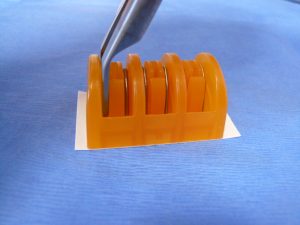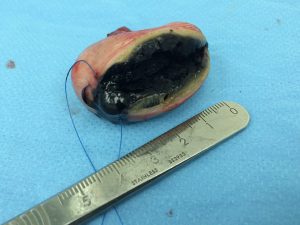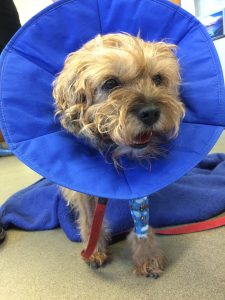Betty’s facelift
Meet Betty the lovely Bassett Hound. Betty is 3 years of age and as you can see from the photog..
+ Read moreFor dogs and cats, the secretion of bile is essential for the natural digestion of dietary fat. However, the biliary tract can become blocked for a number of reasons and the bile flow can slow down. Human beings are more prone to gall bladder stones that originate from cholesterol causing intermittent pain and discomfort. In dogs, gall stones do occur, but perhaps not as frequently and are often an incidental finding. For Border terriers however, there is a more common reason for the gall bladder to become blocked and this is through the development of a mucocoele. Instead of the gall bladder being a reservoir of thin green, yellow or black bile liquid, the bile becomes very viscous , mucoid, glue like in consistency. The consequence is that over time, the gall bladder becomes full of this mucoid bile and starts to rupture. Patients with this condition usually experience periodic poor appetite, vomiting and abdominal pain. Suspicions of a biliary tract problem are often raised with biochemistry blood tests but the diagnosis of a gall bladder mucocoele is confirmed with abdominal ultrasonography.
The treatment of choice is to have the gall bladder removed – a cholecystectomy procedure. If surgical action is not taken, the patients will eventually succumb to an often fatal inflammation of the abdominal cavity called peritonitis. The gall bladder is removed and the cystic duct occluded with special surgical clips to prevent any leakage of bile. Patients like Danny at the Grange Veterinary Hospital in Mold, North Wales greatly benefit from the surgery and quite quickly are feeling brighter and develop a better appetite long term. For dogs that present quite poorly with a biliary mucocoele, have concurrent inflammation of the pancreas (pancreatitis), poor appetite, jaundice and nausea, then it is advised that those patients also have an feeding tube placed into the oesophagus via the neck for extra post operative feeding support . This feeding tube is placed whilst the patients are still under anaesthesia and is very well tolerated, with owners using the tube at home to supplement nutrition for 3-7 days using a special liquid diet. Gall bladder mucocoele is not a condition just affecting Border Terriers, it can be seen in other breeds with Visiting Vet Specialists seeing both a French Bulldog and a Labrador affected during the past year too. The prognosis longterm is very good for patients with a gall bladder mucocoele.


